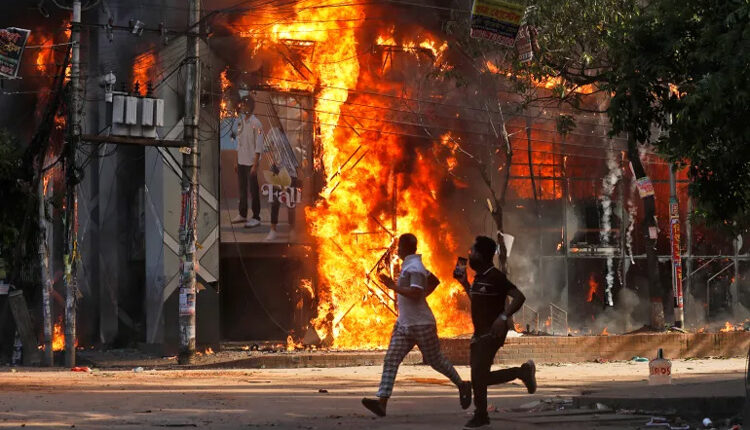Bangladesh protests: 98 killed in students-led fresh violence; India issues advisory
At least 98 people, including 14 policemen, were killed on Sunday, and hundreds of others have been injured as renewed anti-government violent protests swept across Bangladesh during the last three days.
On Sunday, thousands of protesters gathered in several parts of the country to demonstrate against Sheikh Hasina’s government, calling for the prime minister to resign and some chanting “down with the autocrat”.
During the protests, clashes erupted between the police and students, with security forces deploying tear gas and stun grenades to disperse the violent crowd.
The students protested in a similar manner last month during which several people were killed and injured. The demonstrations had taken an even ugly turn as the students set fire to the country’s state broadcaster, a day after Hasina appeared on the network seeking to calm the escalating clashes.
Latest updates on Bangladesh protests:
Thousands of protesters demanding Sheikh Hasina’s resignation clashed with government supporters on Sunday, with scores killed in one of the deadliest days since demonstrations began. According to local media, the death toll in the violent protests may have surpassed 90. The Bangladeshi police and doctors reported deaths in districts in the north, west, south and centre of the country.
According to the police, 14 policemen have been killed across the country during the protests. Of them, 13 were killed in Sirajganj’s Enayetpur police station, and one was killed in Comilla’s Elliotganj, reported PTI. Meanwhile, more than 300 policemen have been injured.
The demonstrators also stormed a station in the northeastern town of Enayetpur. There were some sounds of sustained crackles of gunfire on Sunday as well, with protesters defying a nationwide curfew, reported AFP.
Some videos on social media also showed the demonstrators, surrounded by a tightly packed and cheering crowd, waving a Bangladeshi flag on top of an armoured car as soldiers watched.
According to local officials, Sunday’s protests were joined by unidentified people and activists of rightwing Islami Shashontantra Andolon, which erected barricades on several major highways and within the capital city.
They also attacked police stations and boxes, ruling party offices and residences of their leaders and burnt several vehicles, reported PTI.
In view of the escalating situation, the Bangladesh government ordered the shutdown of mobile internet services in several parts of the country. The government also announced a three-day general holiday on Monday, Tuesday and Wednesday to ensure public safety.
PM Hasina said that those engaging in “sabotage” across the country in the name of protest are “not students but terrorists” and asked people to suppress them with a firm hand.
On Sunday, Hasina also called for a meeting of the National Committee on Security Affairs – the highest policy-making authority of national security, reported PTI. The meeting was reportedly attended by the chiefs of the Army, Navy, Air Force, police, RAB, BGB, and other top security officers.
Meanwhile, amid the violence, India advised its nationals to refrain from travelling to Bangladesh until further notice. “In view of ongoing developments, Indian nationals are strongly advised against travelling to Bangladesh till further notice…All Indian nationals presently in Bangladesh are advised to exercise extreme caution, restrict their movements and remain in contact with the High Commission of India in Dhaka through their emergency phone numbers 8801958383679, 8801958383680, 8801937400591,” the Ministry of External Affairs (MEA) said in a statement.
The United Nations human rights chief Volker Turk condemned the violence and said that the “shocking violence” in Bangladesh must end. “With a mass march on Dhaka planned for tomorrow, and the youth wing of the ruling party called up against the protesters, I am deeply worried that there will be further loss of life and wider destruction. I appeal urgently to the political leadership and to the security forces to abide by their obligations to protect the right to life, and the freedom of peaceful assembly and expression,” Turk said.
What triggered protests and what are students demanding?
The protests began last month after the Bangladesh high court reinstated a quota system for government jobs, including a 30% reservation for families of veterans from the 1971 war of independence from Pakistan, overturning a 2018 decision by Prime Minister Sheikh Hasina’s government to scrap it. However, the Supreme Court suspended the high court’s order after the government’s appeal, setting a date of August 7 to hear the government’s challenge.
The demonstrations escalated last month when Sheikh Hasina refused to meet the students’ demands, citing court proceedings.
The protesting students are demanding an end to a quota system that reserves more than half of government jobs for specific groups, including children of veterans from the country’s 1971 liberation war against Pakistan.

